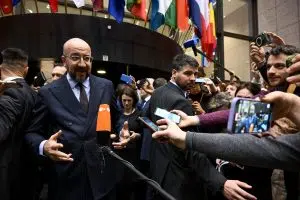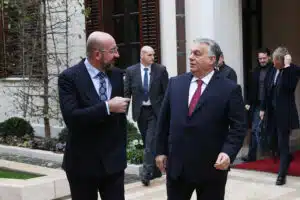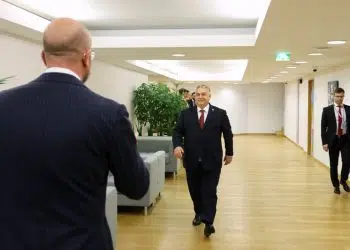Brussels – 2024 could not have started in a more frantic way for EU institutions. The president of the European Council, Charles Michel, announced his intention to run in the June 6-9 European elections for the Belgian (Walloon) Liberal Party. This means that for the first time in the history of the EU, the number one of the European Council is ‘abdicating,’ leaving a dangerous vacuum for the unity of the Union in an electorally crucial year not only on the continent but globally. The leaders of the 27 member countries will now have less than six months to elect Michel’s successor to avoid the scenario that all pro-Europeans fear: that Hungary’s prime minister, Viktor Orbán, the rotating president of the Council of the European Union from July 1, will also temporarily assume the functions of leader of the body that sets the Union’s priorities and guidelines.

Michel’s decision – announced at the Jan. 6 Congress of the Reformist Movement (of which he is president), was motivated as “an act of faith in European” democracy, to play “an active role” in building the future of the Union during the next legislature. Having served as Minister of Development Cooperation (2007-2011), Prime Minister (2014-2019), and President of the European Council for two terms since 2019 (he was confirmed in March 2023), the 48-year-old Belgian politician decided to use the opportunity of the European Parliamentary elections to carve out a space for himself in European institutions. However, this choice poses a few problems in Brussels, both legally and politically.
First and foremost, the question of whether the president of the EU institution can resign in order to participate in the elections for the renewal of the European Parliament. As senior EU officials point out, “there are no legal or other impediments” precluding Michel from running in the upcoming European elections in June. According to Article 15 of the Treaty on European Union (TEU), “in case of impediment or serious misconduct, the European Council may terminate the President’s term of office according to the same procedure” (by qualified majority), while Article 2 of the institution’s rules of procedure specifies what happens in the scenario of “illness, death or termination of office”: the President of the European Council is replaced, “if necessary until the election of his successor,” by the leader of the member country “holding the six-monthly presidency of the Council” of the European Union. Michel’s term of office will expire on November 30, 2024, and that is why the political question of prompt succession arises, considering that Hungary will succeed the current Belgian rotating presidency. Orbán could become the interim president of what is currently considered the most important EU institution.
The appointment of the new president of the European Council
.

From left: European Council President Charles Michel and Hungary’s Prime Minister Viktor Orbán in Budapest (Nov. 27, 2023)
“My successor will be appointed in late June or early July,” Michel already said. Should he be elected as the new MEP, he will cease his duties as President of the institution at the latest during the first available plenary session of the European Parliament (July 16-19). Sources seek to dampen the wave of controversy that has risen in Brussels over a decision that appears to jeopardize the unity of the 27 Member States just months before the European elections, in a year of possible political upheavals at the polls (voting will also take place in the United States, the United Kingdom, and India), pointing out that the institution’s current number one will continue to devote himself “fully” to his responsibilities and that, in any case, the election of the next president “was already scheduled for June 2024”.
However, the accelerated timeline imposed by Michel’s decision is making the heads of state and government of the 27 member countries seek a compromise solution as soon as possible to prevent one of the most controversial EU leaders from leading the Union until the new presidency is appointed. The same sources anticipate the possibility that the next President of the European Council will begin his or her tenure “in the summer of 2024” (before the natural expiration date of Nov. 30) should the 27 leaders decide so. Finally, there is a last parachute to prevent Orbán from taking over the temporary leadership of the Union between July and November: the institution’s rules of procedure “may be changed by a simple majority,” including the one on the automatic appointment of the government holding the six-month presidency of the EU Council.
English version by the Translation Service of Withub




